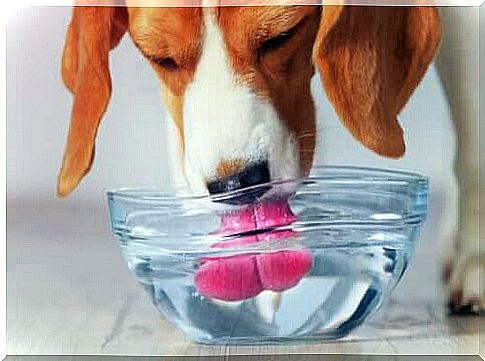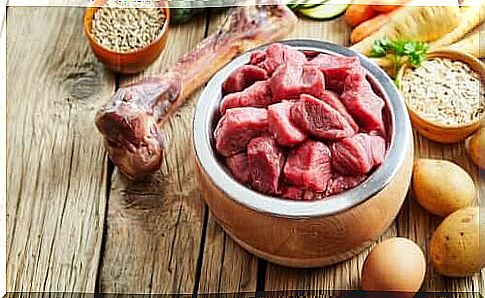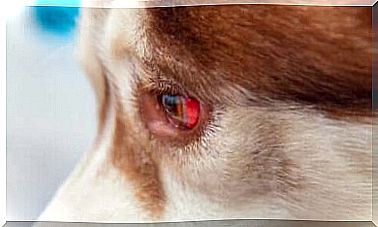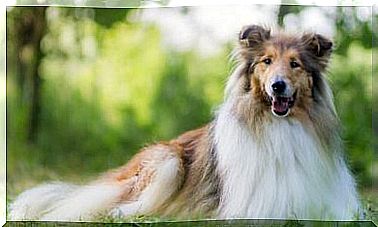What Are The Nutritional Needs Of Dogs?

Most pets depend on humans for food. In the past, these animals were able to select a wide variety of foods to feed on. However, due to domestication, it appears that this quality has been lost or is not maintained. Therefore, it is important to know the nutritional needs of dogs so that, in this way, they have a full, long and happy life.
In general, dogs need a set of nutrients that starts with water, essential for hydration and transport of the rest of the nutrients. In addition, we also have carbohydrates, lipids and proteins, which are the structural and metabolic basis.
Finally, we find vitamins and minerals, essential for the animal’s overall well-being. All these substances allow the dog to perform its vital functions.
Water as a basis for the nutritional needs of dogs

Water is not just vital for maintaining hydration. In fact, seeing that an animal is hydrated also shows that, inside it, the reactions necessary to synthesize and degrade nutrients through digestion can be carried out. Therefore, water is the perfect breeding ground for life.
It is important to know that the water needs of animals vary according to their stage of life, that is, if they are puppies, adults or elderly. Living beings can obtain water by drinking it directly, through food or from metabolic water, which is generated by the typical chemical oxidation reactions of organisms.
energy in nutrition
Energy or caloric density is the amount of energy we can find in a unit of food. It is usually expressed in calories or kilocalories (Kcal). Each type of food offers an amount of energy to the animals, according to their composition:
- 1 gram of fat provides 9.4 kcal
- 1 gram of protein, between 5.3 and 5.8 kcal
- 1 gram of carbohydrate, between 3.3 and 4.3 kcal
For the puppy to stay healthy, it is essential to avoid energy imbalance. This consists of offering the animal more or less energy depending on what it expends in a day. If this is not done, the dog may develop obesity or malnutrition.
Carbohydrates for Dogs
Carbohydrates are composed of carbon, hydrogen and oxygen. Carbohydrates can be classified in different ways. For example, if they are easily absorbable, if they are digested or simply pass through the digestive tract, if they ferment in the intestines, etc.
These substances are essential for the maintenance of the body and are stored in the form of glycogen. Thus, we have glucose, essential for the functioning of the nervous system.
Carbohydrate needs in dogs are not exactly known, but they are known to change with age or physiological state.
However, the dogs have metabolic pathways to synthesize carbohydrates, so it is not necessary to be obtained through diet. They are facultative carnivores and, in nature, obtain carbohydrates from glycogen stored by their prey.
A type of food that is very high in carbohydrates is cereal. They are added to extruded pet food to cut costs as they are not needed in the dog’s diet.

Lipids or Fats in Dog Nutrition
Fats are part of the nutritional needs of dogs. In addition to being the main energy reserve, they have many structural and metabolic functions in the body:
- They are located around nerve fibers to protect them.
- Cholesterol, a type of lipid, is the precursor to certain hormones.
- They constitute lipoproteins, which facilitate the movement of fats in the blood.
- They are structural components of cell membranes, in the form of phospholipids and glycolipids.
- Because they are in membranes, they are responsible for transporting nutrients into or out of cells.
With lipids, dogs get essential fatty acids, such as omega 6 and omega 3. The exact amounts of these nutrients that should be in the dog’s diet are still unknown. However, the concentration of omega 3 must be higher.
Nutritional needs of dogs: proteins
Proteins are large molecules whose basic unit is the amino acid. The functions that these substances play in the body are almost countless, although they can be synthesized as follows:
- Are part of the antibodies
- Give rise to a multitude of hormones
- They are a fundamental part of the muscles.
- Collagen is composed of proteins
- In the blood, proteins carry oxygen and carbon dioxide
- They are essential for the digestion and assimilation of nutrients.
- As enzymes, they have catalytic properties in metabolic reactions
- They are part of hair, nails, tendons, ligaments and cartilage
The degree to which a dog can digest and assimilate the proteins included in its diet depends primarily on its biological value. So a dog food can be very high in protein, but the dog may not be able to absorb any.

Vitamins and minerals
Vitamins are substances that are necessary in minimal amounts, but if they are lacking or left over, they can cause damage to the body. This is because they have very specific structural or metabolic functions.
There are fat-soluble vitamins that are mainly assimilated and stored in the liver. These are the vitamins of groups A, D, E and K. On the other hand, there are water-soluble vitamins. They are quickly absorbed and excreted through urine. This is the case of vitamins from groups B and C.
Finally, we have minerals or mineral salts. Some essential inorganic elements in the nutritional needs of dogs are: calcium, phosphorus, magnesium, sulfur, iron, copper, zinc, manganese, iodine, selenium, cobalt, sodium, potassium and phosphorus.









